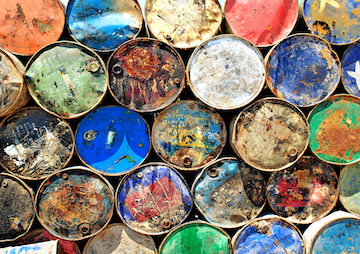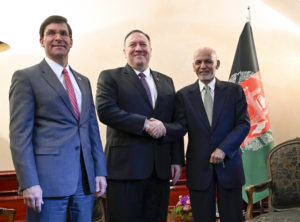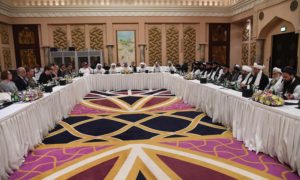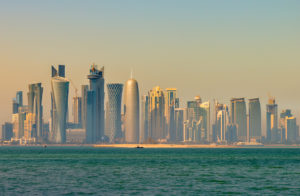Goodbye to the Old Oil Order
Replacing the petroleum-fueled world we’ve known for decades is an anemic, possibly even declining, demand that is likely to force suppliers to fight over a diminishing market. SarahTz / CC-BY-2.0
1
2
3
SarahTz / CC-BY-2.0
1
2
3
The Iranians were, in fact, agreeable to such a freeze, but only after they were allowed to raise their relatively modest daily output to levels achieved in 2012 before the West imposed sanctions in an effort to force Tehran to agree to dismantle its nuclear enrichment program. Now that those sanctions were, in fact, being lifted as a result of the recently concluded nuclear deal, Tehran was determined to restore the status quo ante. On this, the Saudis balked, having no wish to see their arch-rival obtain added oil revenues. Still, most observers assumed that, in the end, Riyadh would agree to a formula allowing Iran some increase before a freeze. “There are positive indications an agreement will be reached during this meeting… an initial agreement on freezing production,” said Nawal Al-Fuzaia, Kuwait’s OPEC representative, echoing the views of other Doha participants.
But then something happened. According to people familiar with the sequence of events, Saudi Arabia’s Deputy Crown Prince and key oil strategist, Mohammed bin Salman, called the Saudi delegation in Doha at 3:00 a.m. on April 17th and instructed them to spurn a deal that provided leeway of any sort for Iran. When the Iranians — who chose not to attend the meeting — signaled that they had no intention of freezing their output to satisfy their rivals, the Saudis rejected the draft agreement it had helped negotiate and the assembly ended in disarray.
Geopolitics to the Fore
Most analysts have since suggested that the Saudi royals simply considered punishing Iran more important than lowering oil prices. No matter the cost to them, in other words, they could not bring themselves to help Iran pursue its geopolitical objectives, including giving yet more support to Shiite forces in Iraq, Syria, Yemen, and Lebanon. Already feeling pressured by Tehran and ever less confident of Washington’s support, they were ready to use any means available to weaken the Iranians, whatever the danger to themselves.
“The failure to reach an agreement in Doha is a reminder that Saudi Arabia is in no mood to do Iran any favors right now and that their ongoing geopolitical conflict cannot be discounted as an element of the current Saudi oil policy,” said Jason Bordoff of the Center on Global Energy Policy at Columbia University.
Many analysts also pointed to the rising influence of Deputy Crown Prince Mohammed bin Salman, entrusted with near-total control of the economy and the military by his aging father, King Salman. As Minister of Defense, the prince has spearheaded the Saudi drive to counter the Iranians in a regional struggle for dominance. Most significantly, he is the main force behind Saudi Arabia’s ongoing intervention in Yemen, aimed at defeating the Houthi rebels, a largely Shia group with loose ties to Iran, and restoring deposed former president Abd Rabbuh Mansur Hadi. After a year of relentless U.S.-backed airstrikes (including the use of cluster bombs), the Saudi intervention has, in fact, failed to achieve its intended objectives, though it has produced thousands of civilian casualties, provoking fierce condemnation from U.N. officials, and created space for the rise of al-Qaeda in the Arabian Peninsula. Nevertheless, the prince seems determined to keep the conflict going and to counter Iranian influence across the region.
For Prince Mohammed, the oil market has evidently become just another arena for this ongoing struggle. “Under his guidance,” the Financial Times noted in April, “Saudi Arabia’s oil policy appears to be less driven by the price of crude than global politics, particularly Riyadh’s bitter rivalry with post-sanctions Tehran.” This seems to have been the backstory for Riyadh’s last-minute decision to scuttle the talks in Doha. On April 16th, for instance, Prince Mohammed couldn’t have been blunter to Bloomberg, even if he didn’t mention the Iranians by name: “If all major producers don’t freeze production, we will not freeze production.”
With the proposed agreement in tatters, Saudi Arabia is now expected to boost its own output, ensuring that prices will remain bargain-basement low and so deprive Iran of any windfall from its expected increase in exports. The kingdom, Prince Mohammed told Bloomberg, was prepared to immediately raise production from its current 10.2 million barrels per day to 11.5 million barrels and could add another million barrels “if we wanted to” in the next six to nine months. With Iranian and Iraqi oil heading for market in larger quantities, that’s the definition of oversupply. It would certainly ensure Saudi Arabia’s continued dominance of the market, but it might also wound the kingdom in a major way, if not fatally.
A New Global Reality
No doubt geopolitics played a significant role in the Saudi decision, but that’s hardly the whole story. Overshadowing discussions about a possible production freeze was a new fact of life for the oil industry: the past would be no predictor of the future when it came to global oil demand. Whatever the Saudis think of the Iranians or vice versa, their industry is being fundamentally transformed, altering relationships among the major producers and eroding their inclination to cooperate.
Until very recently, it was assumed that the demand for oil would continue to expand indefinitely, creating space for multiple producers to enter the market, and for ones already in it to increase their output. Even when supply outran demand and drove prices down, as has periodically occurred, producers could always take solace in the knowledge that, as in the past, demand would eventually rebound, jacking prices up again. Under such circumstances and at such a moment, it was just good sense for individual producers to cooperate in lowering output, knowing that everyone would benefit sooner or later from the inevitable price increase.
Your support matters…Independent journalism is under threat and overshadowed by heavily funded mainstream media.
You can help level the playing field. Become a member.
Your tax-deductible contribution keeps us digging beneath the headlines to give you thought-provoking, investigative reporting and analysis that unearths what's really happening- without compromise.
Give today to support our courageous, independent journalists.






You need to be a supporter to comment.
There are currently no responses to this article.
Be the first to respond.